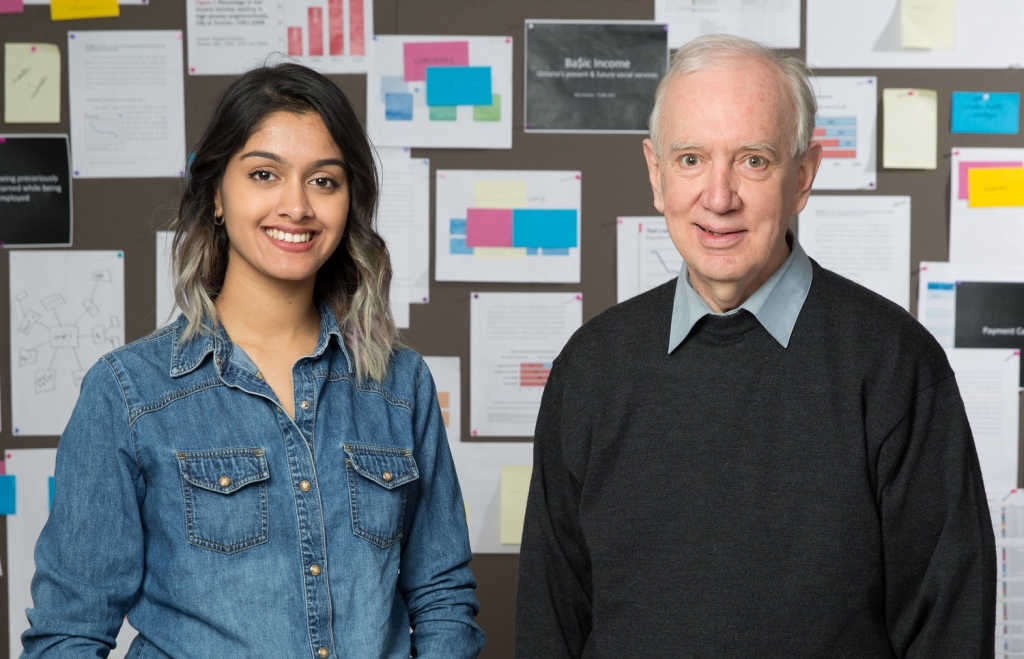Could basic income work in Canada?
 Featured Image Caption
Featured Image Caption
A student-faculty research collaboration at Trinity College could be part of future provincial decisions on a better social assistance system.
Posted on September 7, 2017
From Finland to Namibia, from India to New Zealand, countries around the world have been actively talking about the idea of basic income. Ontario is one of a very few jurisdictions with an actual pilot underway. Unlike welfare payments, which are available only to people who meet a threshold of need and come with strings attached, basic income means paying the eligible individual an unconditional lump sum.
Tests have shown basic income improves health and living standards, while reducing crime and addiction. New business startups proliferate, economic activity increases. Is this an idea whose time is come?
At U of T’s Trinity College, fourth-year student Nishani Chankar and professor Leslie Boehm have collaborated on a research project that could inform Ontario’s upcoming decisions on basic income.
Working with the provincial government to produce useful research
Chankar applied to work with Boehm, who is an expert on health policy, for a pair of Trinity classes. TRN 377 and TRN 477 help students develop a major research paper making policy recommendations and then submit it to an academic journal. Just weeks after the pair decided Chankar would research basic income, the Ontario government announced a basic income pilot project for 2017, based on recommendations by Hugh Segal, Head of U of T’s Massey College.
“Suddenly, our work went from theoretical to practically applicable,” says Chankar. The duo met with the Ministry of Community and Social Services, and tailored the project to researching the kinds of data the government could use.
Chankar’s paper, Basic Income in Ontario: Taking the Approach of the In-Need Stakeholder, was filed to the ministry in February 2017. In it, she investigates a range of relevant issues: how many people in the GTA have precarious employment, the benefits to society of helping new immigrants increase their income, regional variation in market rents, the role of stigma in social assistance outcomes and more.
“The time has come for Basic Income in Ontario,” she concludes. “Housing needs and the needs of newcomers are currently two of the most pressing issues within the province. If we place first and foremost the needs of those who would benefit most from an upgraded system of social assistance, then we cannot fail in creating a stronger structure for our province as a whole.”
How donor support is key to impactful projects
Chankar and Boehm’s collaboration included a third partner: alumni and friends who gave to Trinity’s Annual Fund. “Without donor support this activity would not exist,” says Boehm.
The research classes TRN 377 and TRN 477 were launched thanks to the Anne Steacy Program in Science Writing, funded with a gift from alumna Anne Steacy (BA 1976 Trinity). Creating a forum for undergraduates to conduct intensive original research benefits both the students and the wider community. The Ontario government will consider Chankar’s findings, and she and Boehm are already in talks about sharing their findings with the government of Prince Edward Island.
The students who take the course are creative, smart and filled with incredible energy, says Boehm. “There need to be vehicles to challenge this talent and engage this energy. Where this becomes important is that, if the past is any indication, the Trinity students of today are Ontario and Canada’s leaders of tomorrow.”
Donations to U of T Annual Funds are especially effective in transforming the undergraduate experience. The University can direct such support where it is urgently needed, making the impact of your gift immediately apparent. As well as enabling hands-on original research like Chankar’s, annual fund donors are also supporting many other projects with big spin-off benefits, from student scholarships and bursaries to travel grants to student services and programming.
